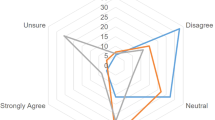Abstract
CONTEXT: By providing information and possibly shaping parents' preferences, health-care providers are thought to play a critical role in parental decisions to enroll their infants in research. Yet, little is known about health-care providers' beliefs about research with newborns. Previous studies suggest that parents and health-care providers are often at odds regarding attitudes towards research.
OBJECTIVE: To examine the attitudes of health-care providers concerning the acceptability of research with newborn babies and the degree of research-related risk to which they would be willing to expose their own infant. These findings were compared with a previous study of parental attitudes.
DESIGN, SETTING AND PARTICIPANTS: A survey (pretested questionnaire with 20 scaled items and five case scenarios) of 50 doctors and 64 nurses conducted in a large tertiary care center in western Canada.
RESULTS: Study limitations were a response rate of 64.5% among nurses but only 22% among physicians. Both doctors and nurses were strongly supportive of research with newborns, but nurses were more averse to exposing infants to risk. Only 76.0% of nurses, compared to 92.2% of physicians, agreed that informed consent should be sought for all forms of research. When results were compared with parental perceptions, health-care providers were more likely to believe that research should be conducted for the good of all babies. Parents were generally less aware of the existence of an approval process for research in general. In responding to hypothetical scenarios with risk and direct benefit, parents were less willing to enroll their infants than were health-care providers. Approximately 30% of both groups would be willing to enroll their infants in a study involving moderate risk and no direct benefit.
CONCLUSIONS: Views of nurses, physicians, and parents regarding research with newborns are different. Overall, there is support for research; however, nurses are more likely to never enroll their own baby and enroll babies into minor studies without consent.
This is a preview of subscription content, access via your institution
Access options
Subscribe to this journal
Receive 12 print issues and online access
$259.00 per year
only $21.58 per issue
Buy this article
- Purchase on Springer Link
- Instant access to full article PDF
Prices may be subject to local taxes which are calculated during checkout


Similar content being viewed by others
References
Ferguson PK . Patients' perceptions of information provided in clinical trials. J Med Ethics 2002;28:45–48.
Mason S, Allmark P . Obtaining informed consent to neonatal randomised controlled trials: interviews with parents and clinicians in the euricon study. Lancet 2000;356:2045–2051.
Liaschenko J, Underwood SM . Children in research–fathers in cancer research: meanings and reasons for participation. J Fam Nurs 2001;7:71–91.
Moore S . A need to try everything: patient participation in phase I trials. J Adv Nurse 2001;33:738–747.
Roberts LW, Warner T, Brody JL . Perspectives of patients with schizophrenia and psychiatrists regarding ethically important aspects of research participation. Am J Psychiatry 2000;157:67–74.
Schaffer D, Shaw GM . Mothers' motivations to participate in a pregnancy health survey. Public Health Reports 1992;107:731–733.
Zupancic JAF, Gillie P, Streiner DL, Watts JL, Schmidt B . Determinants of parental authorization for involvement of newborn infants in clinical trials. Pediatrics (serial online) 1997;99:e6 Available from URL: http://www.pediatrics.org.cgi/content/full/99/1/e6.
Singhal N, Oberle K, Burgess E, Huber-Okrainer J . Parents' perceptions of research with newborns. J Perinatol 2002;22:57–63.
Slevin ML, Stubbs L, Plant HJ, et al. Attitudes towards chemotherapy: comparing views of patients with cancer with those of doctors, nurses and the general public. BMJ 1990;300:1458–1460.
Cheng JD, Hitt J, Koczwara B, et al. The impact of quality of life on patient expectations regarding phase I clinical trials. J Clin Oncol 2000;18:421–428.
Schutter KM, Burnett CB . Factors that influence a patient's decision to participate in a phase I cancer clinical trial. Oncol Nurs Forum 2000;27:1435–1438.
Simon C, Eder M, Raiz P, Zyzanski S, Pentz R, Kodish ED . Informed consent for pediatric leukemia research: clinicians' perspectives. Cancer 2001;92:691–700.
Burnett CB, Koczwara B, Pixley L, Blumenson LE, Hwang YT, Meropol NJ . Nurses' attitudes towards clinical trials at a comprehensive cancer center. Oncol Nurs Forum 2001;28:1187–1192.
Oberle K, Singhal N, Huber J, Burgess E . Development of an instrument to investigate parents' perceptions of research with newborn babies. Nurs Ethics 2000;7:327–337.
Edwards SJL, Lilford RJ, Hewison J . The ethics of randomised controlled trials from the perspectives of patients, the public and healthcare professionals. BMJ 1998;317:1209–1212.
Burgess E, Singhal N, Amin H, McMillan D, Devrome H . Consent for clinical research in the neonatal intensive care unit — a retrospective survey and a prospective study. ARCH DIS CHILD 2003;88:F280–F286.
Cox K, Avis M . Psychosocial aspects of participation in early cancer drug trials. Can Nurs. 1996;19:177–186.
Hayman RM, Taylor BJ, Peart NS, Galland BC, Sayers RM . Participation in research: informed consent, motivation and influence. J Pediatr Child Health 2001;37:51–54.
Fry C, Dwyer R . For love or money? Why injecting drug users participate in research. Addiction 2001;96:1319–1325.
Acknowledgements
We are grateful to the University of Calgary and the Calgary Health Region for support of this project, and to Michael Fox for collecting the data.
Author information
Authors and Affiliations
Appendix A
Appendix A
Questionnaire B — 5 scenarios are given in Table A1.
Rights and permissions
About this article
Cite this article
Singhal, N., Oberle, K., Darwish, A. et al. Attitudes of Health-Care Providers towards Research with Newborn Babies. J Perinatol 24, 775–782 (2004). https://doi.org/10.1038/sj.jp.7211171
Published:
Issue Date:
DOI: https://doi.org/10.1038/sj.jp.7211171
This article is cited by
-
The ethical issues regarding consent to clinical trials with pre-term or sick neonates: a systematic review (framework synthesis) of the empirical research
Trials (2015)
-
A thematic analysis of factors influencing recruitment to maternal and perinatal trials
BMC Pregnancy and Childbirth (2008)
-
Prenatal Care and Delivery Room Staff Attitudes Toward Research and The National Children’s Study
Maternal and Child Health Journal (2008)


